Do you know Personal Hygiene for Kids? Do you have kids who touch every nook and corner of your house and freak you out? Or, maybe your kids just came back home after playing outside and instantly grab food without washing their hands properly? I bet no parent has that of a high tolerance for dirty kids. But what to do when your kids are not hygienic enough and frequently fall sick?
Well, it’s not that difficult to develop good personal hygiene habits in your kids. All you have to do is continue reading through this blog and follow the guidelines.
Table of Contents
What is Personal Hygiene?
In general, hygiene refers to a series of practices that preserve and protect the health from diseases. And personal hygiene, on the other hand, refers to maintaining the body’s cleanliness. It comprises personal habits like having a bath frequently, washing hands, brushing teeth, trimming fingernails and more.
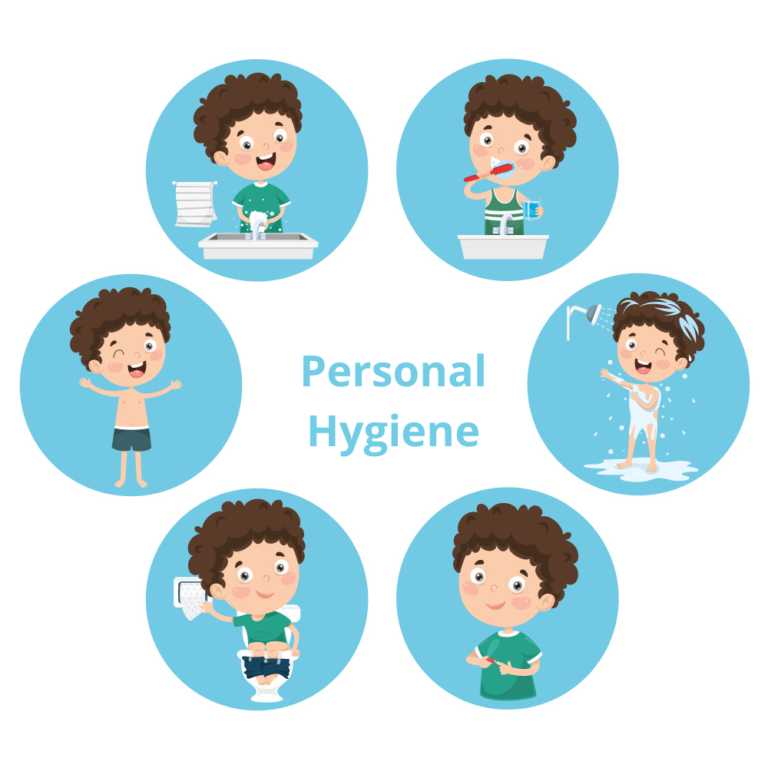
Personal hygiene helps you to keep yourself clean by preventing viruses from lingering on our body. Most of the contagious diseases spread through facial routes and are transmitted through direct contact. As a result, kids are the most susceptible to getting infected. So, you should teach your children about hygiene and create a personal hygiene routine for them.
Why should you teach personal hygiene to kids?
Hygiene plays a crucial role in protecting us from infectious disease. Maintaining cleanliness is the foremost thing that strengthens our immune system. However, a child’s immune system is not fully developed to fight against viruses, bacteria and other foreign bodies. And kids are nonetheless oblivious of their surroundings.
Children are always reaching out to grab everything they see in front of them. So, they come into contact with dirt and dust that may carry infectious microorganisms. But kids are not careful enough to avoid unhygienic things. As a result, the risk of illness and diseases spreading through viruses and bacteria is very high.
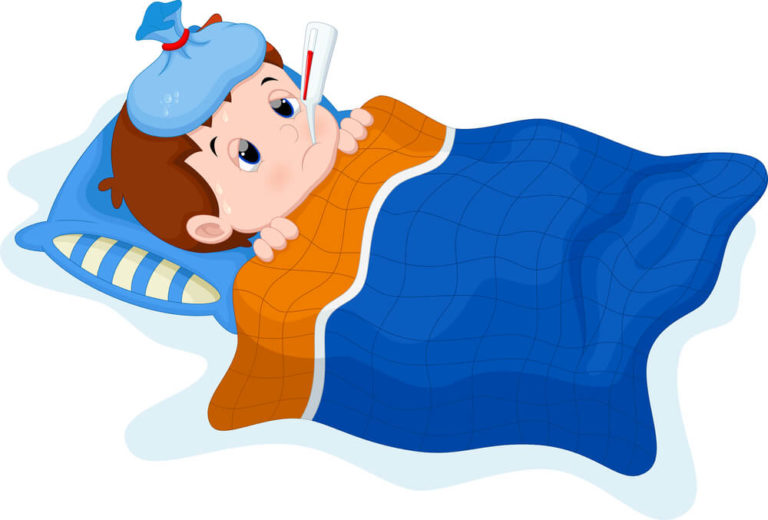
Therefore, it’s the best time to teach your kids about the necessary personal hygiene activities and share awareness concerning the immune system’s functions to personal hygiene.
Telling a kid not to touch things around all the time might not save them or stop them from doing so, especially when you are not around.
So, parents should teach their kids some basic habits that they can develop while growing up.
You can protect your kids from illness and frequently falling sick if you can teach them the importance of good personal hygiene from a young age.
However, rearing a child with the habit of personal hygiene practices can be very engaging and challenging, especially if you don’t know all the basics of personal hygiene.
5 Types of personal hygiene for kids
Kids should maintain their cleanliness habits at all times whether they are at home eating, playing, sleeping and helping you in the kitchen or outside the home in school or playgrounds. Because personal hygiene is all about keeping yourself and your surroundings clean. Here are some essential personal hygiene tips for your kids to ensure their healthy lifestyles:
- Food hygiene
- Hand hygiene
- Body hygiene
- Health hygiene
- Oral hygiene
Let’s get started with the first one-
1. Food hygiene
According to WHO, almost 1 in 10 people in the world fall sick after eating unhygienic foods. That is 44 people every minute or 63360 people every day or 23126400 people are getting sick every year because of not eating healthy and not maintaining food hygiene.
Stomach-ache, vomiting, diarrhoea, cholera and typhoid are some common diseases that unhygienic foods can cause. Even some food-borne diseases can lead to blood infections, paralysis or even kidney failure.
Therefore, you have to make sure that everyone in your family maintains food hygiene while preparing, serving, and eating food to prevent the spread of germs. Here are a few food hygiene habits that you should practice along with your kids.
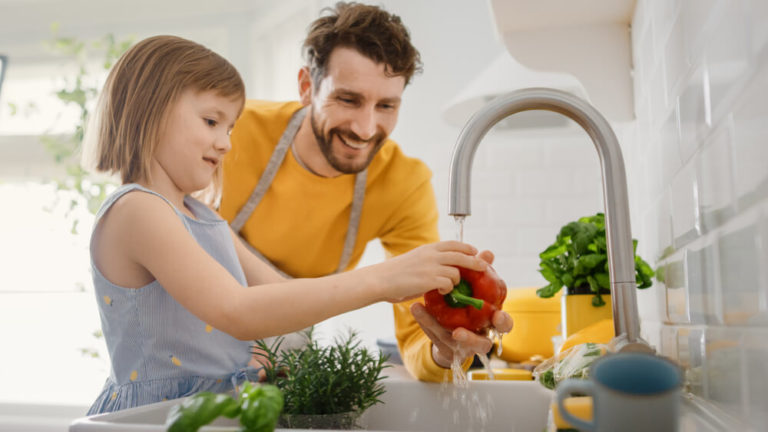
- Always wash your hands with clean water and soap before touching foods.
- Remember to wash your hands every time after handling raw meat or seafood, whether you are cooking or your kids are helping in the kitchen.
- Wash your hands every time after using the toilet and before returning to the food.
- Always store meat, fish and poultry foods in sealed and separate containers.
- Never store raw and fresh foods with cooked foods.
-
Use different utensils to handle raw meat, vegetables, sandwiches etc.
- Rinse fresh fruits, salad greens and vegetables with clean water, especially before serving these uncooked.
- Avoid serving undercooked foods, unpasteurised milk and cheese products to your kids.
- Remember to eat foods soon after they are cooked. If you are serving the foods for later, refrigerate right away.
- Teach your kids to use a clean cloth to wipe hands and mouth.
- Cover the food containers with lids
You can teach these basics about food hygiene to your kids, meanwhile, talk to them about germs and bacteria.
You may find it useful: 20 Healthy Foods to Eat Everyday According to Expert Advice
2. Hand hygiene
A simple act like washing hands can prevent your kids from getting sick. It’s the most crucial and easy-to-achieve hygiene habit. But kids don’t remember to wash their hands. Therefore, it’s your job to remind the kids to wash their hands from time to time.
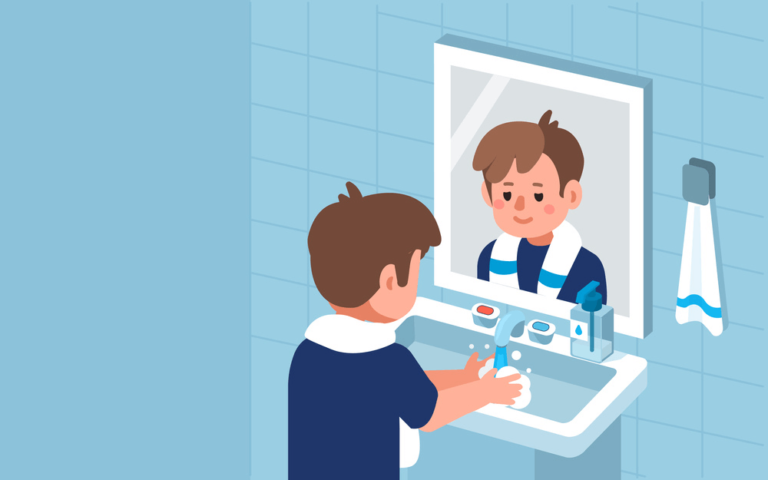
- As soon as your kids return home from school or play, you should always remind them to freshen up first before touching any food or anything else.
- Demonstrate the proper ways to wash hands thoroughly.
- Trimming nails is very important because a lot of germs and dirt can amass under nails. And kids tend to bite their nails which you should discourage them from doing so. Cut your kid’s nails routinely and teach them to do so because they should be able to cut their fingernails around the age of 7.
- Remind your kids to wash their hands every time they pet an animal.
You should also teach your kids to make a habit of washing their hands every time after they:
- Use the toilet.
- Clean the house.
- Visit a sick friend or relative.
- Sneeze, cough and clear their nose. It’s better to develop a habit of using a handkerchief.
Handwashing is an activity that takes less than a minute, and it’s the most effective and easiest way to keep germs and infections away.
3. Body hygiene
One of the most important aspects of personal hygiene is taking care of your body. Body hygiene means to keep every part of your body clean to stay healthy. Healthy body hygiene habits include taking care of the followings:
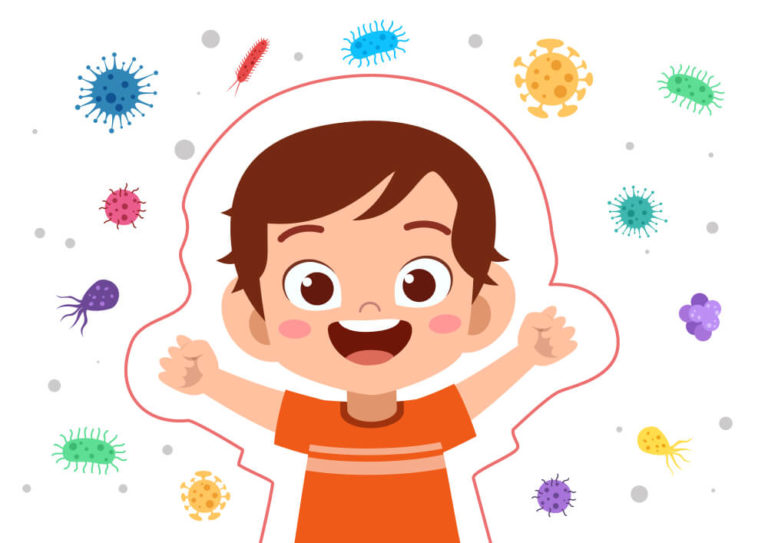
Skin
The skin is the largest organ in our body that protects us from all sorts of microbes and elements. It’s also vulnerable to bacteria and other germs in case the skin is scratched or wounded. Unnecessary accumulation of bacteria on the skin can cause body odour and skin diseases like infections leading to tender lumps and boils. You can do the followings to ensure your kid’s skin hygiene:
- Teach your kids to have a bath every day. It’s also important to take a shower before or after school and certainly after playing outside.
- Teach them how to clean different parts of the body – the hands, armpits, legs, feet, joints, back, belly button, elbows, and knees. You should show them first how to do it and then let them practice it.
- Keep different soaps for bathing for your kids.
- Ensure your kids don’t rush while having a bath or shower because they might overlook cleaning their ears and neck.
Hair
Hair hygiene requires as much importance as skin hygiene. Messy hair and improper care can lead to problems like head lice, dandruff and other scalp infections.
- Kids are susceptible to getting head lice. So, you should teach your kids to wash their hair at least twice a week.
- You should also teach your kid not to share personal objects like combs, pillows, and hats with others.
- If your girl has long hair, tell her not to comb it carefully with wide tooth-comb. Tying the hair up will prevent the accumulation of dirt on hair.
Feet
I bet you’ve heard the phrase “smelly feet” But do you know why does it happen? It occurs due to the accumulation of bacteria on the feet, especially when the bacteria come in contact with sweat. If your kids wear shoes without socks all-day, more dirt tends to gather on their feet. You can help your kids keep their feet clean with these steps:
- Teach your kids to wash their feet every time they come home from school or after playing.
- Instruct them to clean their feet properly by rubbing with soap between the toes and under toenails.
- Afterwards, use a clean cloth to dry the feet.
- Encourage your kids to keep their shoes clean.
- If your kid gets wounded during playing, teach them how to keep the wounds clean.
- Afterwards, use a clean cloth to dry the feet.
4. Health hygiene
Most of the kids have common colds 6 to 8 times a year before the age of 6. Therefore, it’s imperative to ensure your kids’ health hygiene to fend off germs and other bacterial infections from spreading.
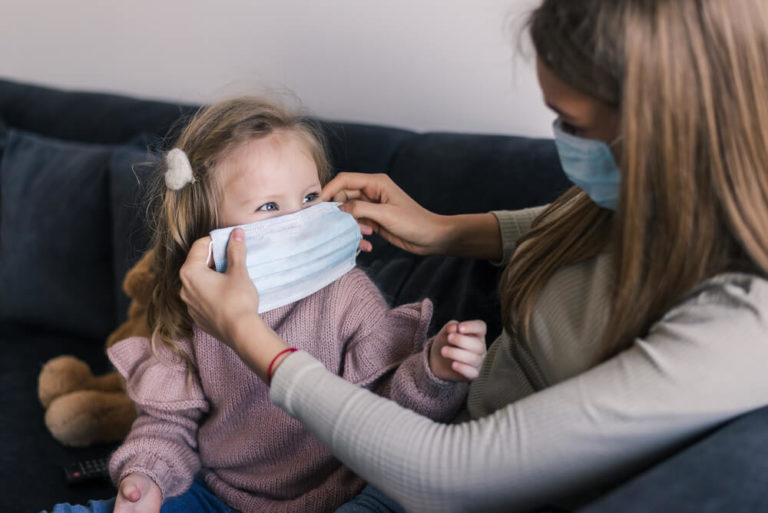
- When your kid is down with flu or any other infectious sickness, don’t send your child to school or to play. Avoiding close contact with other kids will stop the spreading of germs.
- Cover the mouth with tissue or handkerchief while sneezing or coughing. Instilling this habit in your kids will stop the spreading of germs.
- Using hand sanitiser is another good habit that you should teach your kids. In cases like when the water is too cold to use, or you don’t have access to soap or water, a hand sanitiser can be really convenient, especially in the winters.
- Always use separate bedclothes for children in the family.
- Try to maintain a clean surrounding. Unclean desk, bedroom and toilet mean an abundance of germs. So, you should teach your kids to keep their room clean at all times.
- If your kid spill or drop something on the floor, you should teach them to clean.
- Teach your kids about the basics of toilet and bathroom cleanliness standards. For instance, flushing the toilet after using, throwing used tissue and other rubbish in the bin etc.
- Make sure your kids change their clothes twice a day and put away the dirty clothes in the laundry basket.
5. Oral hygiene
Oral hygiene is another vital hygiene activity that if not appropriately cared, can develop bad breath, cavities and other oral diseases. But all these can be avoided if your kids have the habit of maintaining good oral hygiene. Here’s how you can do that.
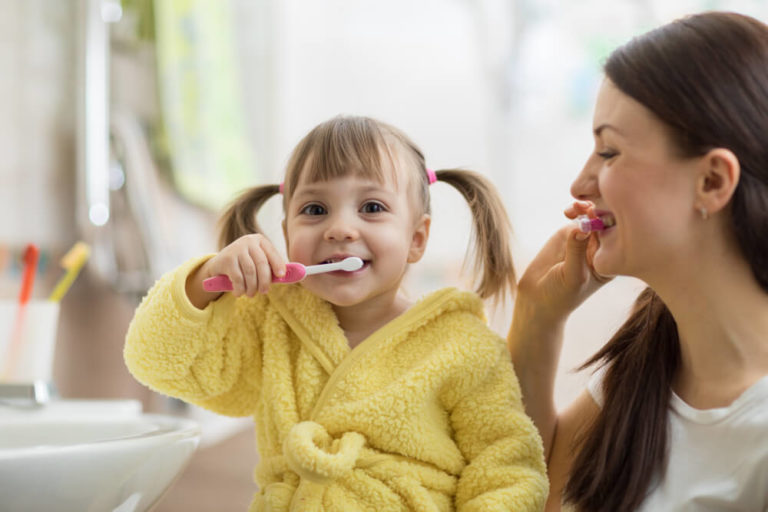
- Make sure your kids brush their teeth twice a day.
- Teach them how to floss as well.
- Kids love candies, but it’s important to wash the mouth afterwards. So, remind your kids to do so, even after having food.
- You should also tell your kids to gargle with warm salt water or use mouth wash once in a while.
- And it’s recommended to visit the dentist every six months.
Keep in mind that no habit develops overnight. And teaching your kids about personal hygiene can be challenging. Therefore, you should be patient while implanting these healthy habits into kids.
10 Tips for teaching kids about personal hygiene
Once you have started practising the basics of personal hygiene with your kids, doesn’t mean you’ll always see them perform all the tasks when you are not around because kids have a tendency not to listen to you. So, just telling and advising your kids what to do might not work all the time.
You have to make your kids understand that personal hygiene is a part of life. Having good personal hygiene habits not only keeps you safe but also speaks about your personality.
Below is a list of tasks you can do to teach good personal habits to your kids effectively.
1. Introduce the concepts of germs and bacteria
You should start explaining the concepts of germs and bacteria to your kids from an early age. If your kids know how they can catch germs and what will happen if they don’t maintain cleanliness, they will grow up with a better understanding of maintaining personal hygiene.
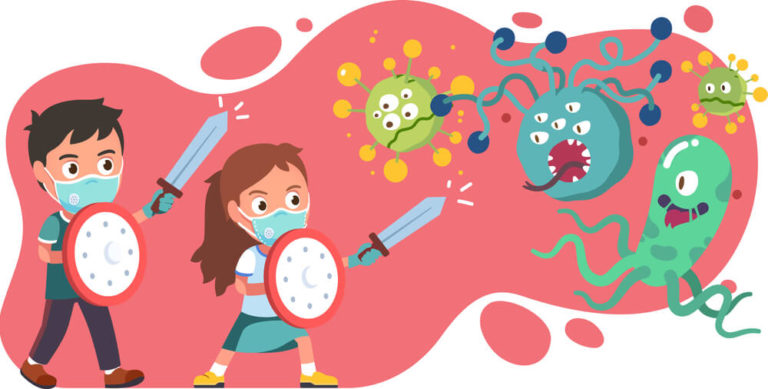
But don’t complicate or exaggerate too much, or they will develop a phobia of germs or germophobia.
2. Elucidate good and bad habits
Kids are mostly driven by their instincts and interests. That means they won’t always think clearly before engaging in any task, let alone differentiate good habits from bad ones. Therefore, you should teach your kids what is considered a good habit and a bad habit.
Listing out good and bad personal hygiene habits will help you clearly explain them to your kids. But you must also ensure that you are telling your kids about hygiene habits while playing or having fun. Learning through fun activities is the best way to go. Always remember to praise your kids when they display good personal hygiene habits.
3. Always start with the basics
Dumping too much information and instructions about personal hygiene into your kids’ minds won’t yield any result. Because kids’ minds can’t comprehend all the information, and they might find things overwhelming.
So, you should instead start with simple activities like washing hands or bathing regularly. Once the kids start doing these activities regularly, you can put them into the next basic hygiene task.
4. Utilise the right resources
If you want your kids to carry out personal hygiene activities properly, you need to make sure that you have all the necessary resources available in your home. For example, keeping the soap in the dispenser, tissues, paper towels and dustbins in place etc. If you keep the supplies in stock, your kids won’t skip any of the personal hygiene tasks neither they will find any excuse not to follow personal hygiene routines.
So, you should instead start with simple activities like washing hands or bathing regularly. Once the kids start doing these activities regularly, you can put them into the next basic hygiene task.
5. Talk about the pleasant smell and foul smell
The human nose can recognise and distinguish a wide range of smells. And instinctively know which scents are good and which are foul. But can a kid label good and bad odour? Yes, they can but not all the time. Therefore, you should help your kids to learn the difference between good and bad smells. Explain to them that an odour is an unpleasant smell.
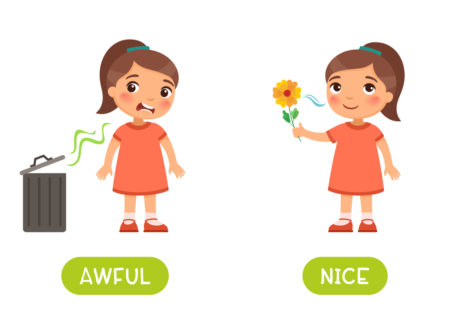
Finding different items in your home and discussing the smell can help your kids to understand the differences. For instance, various items in your fridge, whether stinky or fragrant, the scent of different flowers, the smell of sweet bakery and something savoury can help them learn the difference between good and bad smells.
If your kids understand when their clothes, body or feet smell bad, they will tidy up to keep the stinky smell away.
6. Talk about the appearance
Getting teased or bullied at school because of scruffy appearance is very common. But to avoid that, you need to ensure that your kids wear clean clothes, smell fresh and stay hygienic in school. You should teach your kids about different grooming activities like wearing clean and pressed clothes, combing the hair, wearing polished shoes etc.
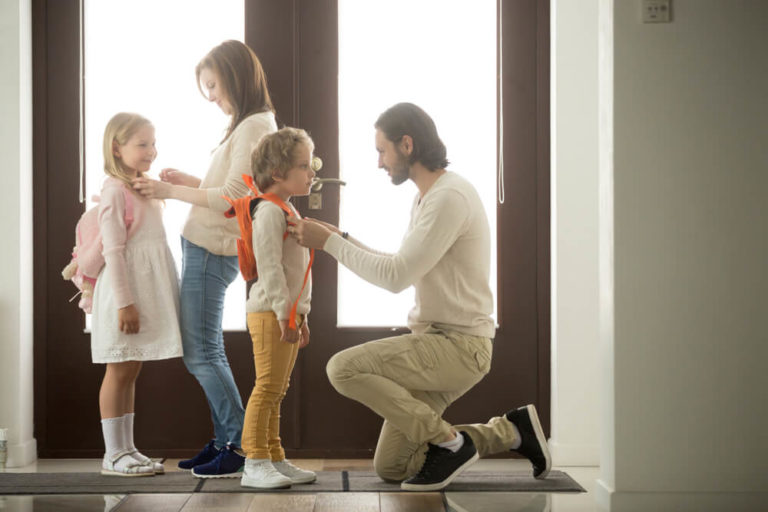
Also, make sure that your kid’s school bag and lunch box are clean and hygienic. The more your kids understand the importance of being presentable to others, the more cleanliness they will maintain.
7. Fun with hygiene
Kids love to have fun and do things that make them happy. So, you should make the learning process a fun activity. Try teaching your kids about personal hygiene in different ways like games, poems, posters etc. This way, the hygiene won’t seem like a dreadful topic to children.
8. Lead by example
If you want to inspire your child to perform hygiene activities, you must first practise them yourself. Doing little things together like cleaning the house, table, and kitchen or brushing teeth regularly, will encourage your child more. So, perform all the personal hygiene activities with your kids and become their role model.
9. Practice hygiene as a family
It doesn’t take much effort to implement these personal hygiene habits in your kids’ lives if everyone in your family practises these activities. Make sure all the family members understand the importance of good personal hygiene. It will help your kids follow your instructions thoroughly. Ultimately, you, along with your kids, will get to enjoy better health.
10. Showing proper hygiene
Show them how to wash their hands properly, especially before eating and after using the bathroom. Teach them to cover their mouths when they cough or sneeze, and to brush their teeth twice a day. Remind them to take baths regularly and to keep their nails short. These simple habits will help them stay happy and healthy!
4 Nurturing good personal hygiene for kids
Family is the first learning school for children. All the good habits, qualities and right practices come within the confines of your home. This is because kids often learn through imitation. If you have a habit of maintaining all the daily personal hygiene activities, your kids will watch and observe you, and then they will tend to develop their habits too.
And once you’ve put your kids into performing daily hygiene activities, it’s time for you to teach them to understand the importance of personal hygiene in life. You can follow some strategies that will help your kid develop better hygiene habits.
1. Set reminders
Set a reminder for each daily hygiene activities such as shower, brushing teeth, clipping nails etc. It will help you ensure and keep an eye on your kid’s daily hygiene routine.
2. Make it a fun learning experience
Remember, kids often lose interest or can get bored quickly while performing a routine task. Therefore, you need to turn the learning process into fun games. For example, attaching a story or poem or song that extols the goodness of brushing teeth or washing hands will help you to keep your kid’s attention on the task.
3. Put up signs
You can put up signs on the kitchen and toilet. If you put a sign like “Wash your hands” in the kitchen and the bathroom, it will remind everyone in your family to do so, including the kids. You should remember that kids can’t maintain all the hygiene tasks every day. Therefore, you should make sure to prioritise and focus on each habit one at a time and practice it for at least 2-3 weeks.
4. Demonstrate
If you want to instil positive and healthy habits into your kids, you must explain the process of each personal hygiene task. For instance, showing and telling your kids about proper handwashing.
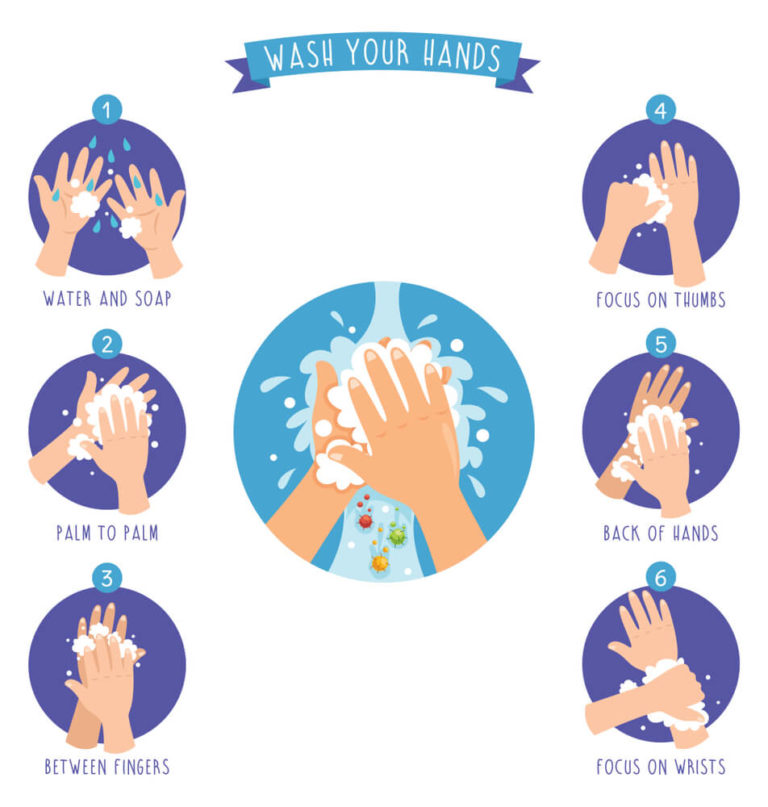
Firstly, wet your hands with clean running water and then apply soap to lather your hands, fingers and under the nails. Rubbing your hands for at least 20 seconds is recommended. Then wash it with water. And finally, dry your hands with a clean towel. You should also tell your kids about conserving the water by turning the tap when it’s not in use.
3 Personal hygiene activities for kids
As kids are not high on following instructions, inculcating personal hygiene habits into kids can be a daunting task. However, kids love to play, and they can learn better through activities. So, here are a few games and activities you can engage your kids into to make personal hygiene fun for your kids.
1. Germ transfer game
It’s a fun game that you can play with your kids to teach them how germs are transferred from one person to another. You’ll only need some washable paints to play this game. Start by applying the paint on your hands when the kids are not looking at you, and then pretend to sneeze. After that, go about the direction you want and touch things around while spreading the paint. Ask your kids to follow your steps and touch the spots you have left with paints.
Now, you can ask the kids how the paints spread all around the place. Lastly, you can emphasize the fact that the kids got colours from you because you didn’t wash your hands after sneezing.
2. Glitter hands
To play this game you need glitters, soap and water. Start by applying some glitter to your kid’s hands and then ask them to wash their hands to get rid of the glitter.
The fact that glitter is naturally sticky and doesn’t go away quickly without a good rinse will make the kids wash their hands properly. Tell the kids to use soap and rub their hands for at least 30 seconds to get rid of the glitter.
3. Good habit, bad habit
This is a fun game you can play with your kids anytime and anywhere. All you need to do is, make a list of activities, including the activities your kids do. Then, tell the kids to identify which habit is good and which is bad. Through this game, you can point out your kids’ practices and remind them whether they should continue it or not. If they get the answers right, reward them with treats.
Conclusion
Personal hygiene makes your kids vulnerable to infectious diseases. But you can prevent it from happening. You can ensure your kids’ healthy lives and keep them away from bacteria-causing diseases by practising the personal hygiene habits mentioned above. If your kids have already developed personal hygiene habits, then that’s great. If not, now is an excellent time to teach them.
Recent posts
- The Impact Of Remote Work On Women In The Marketing Industry
- 5 Reasons Why You Should Pursue a Cybersecurity Career
- Differentiating Web Design and Web Development
- Top 10 Social Media Management Tools for Businesses in 2024
- Why is Child Development so Important in Early Years
- Line Management: How to be a Good Line Manager?
- How Long Should a Health Sector Career Take?
- The Importance of BSL in Everyday Life
- Why Corporate eLearning is Essential for Organisational Training
- Take your Business Expertise to the next level: Get your MBA






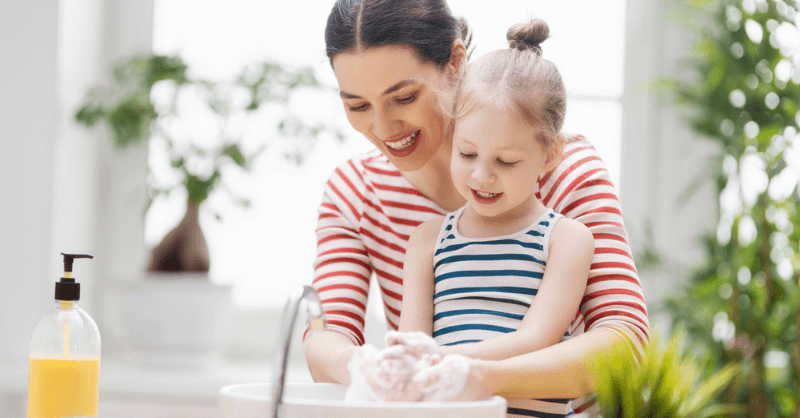
 March 02, 2023
March 02, 2023








